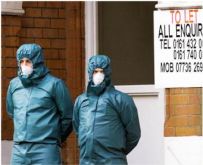Algerian Terrorist ‘Hacks’ Can’t Escape Al-Qaeda’s Shadow
Aspiring Islamic terrorists sick of comparisons

SNAPPER McGEE
Hopeful Algerian terrorists fail miserably in early terror training attempts to fit in without drawing attention.
|
They’re young. They’re dangerous. They’re filled with hate for all Western culture and the influence it’s had on Islamic countries. No, they’re not Al-Qaeda; they’re Algerian, and they’re tired of being compared to Osama bin Laden’s terrorist units.
If you haven’t heard of these Algerian up-and-coming homeland security risks, it’s not surprising. They’ve only recently made any news at all, and it took a far backseat to growing concerns about Iraq and North Korea, as well as troubling domestic issues like the economy and Joe Millionaire. They’re relegated to the back page of the World news right now, and they’re not happy about it.
“It’s just like Americans to ignore you as a threat if you haven’t set off a bomb in their country or anything,” said one leader of the as-yet-unnamed group, who refused to be identified by name but used the alias, “Stonewall.” “It won’t be that way forever. One of these days our name will be bigger than Al-Qaeda—as soon as we agree on one. People will ask, ‘Al-Qaeda who? Were they anything like…’ well, then they’ll say the name of our group, when we have one.”
It’s a strong feeling throughout the group, as well as other aspiring Islamic extremist terrorists out there: Al-Qaeda has become the Elvis Presley of anti-Western guerrillas, and it’s a double-edged sword.
“On one hand,” said one youth, known as “Itchy,” “people are finally taking terrorists serious again, for the first time since those Iranian hostages in the 70s. But now the bar is set so high nobody can compete with them. A lot of us don’t have the kind of funds and numbers needed to destroy an American landmark or symbol of Western wealth. We’re the independent terrorists, the ones doing it for the real love of Allah, and we have the better arguments, the better fatwas, and when we die for the glory of Allah’s cause we’re receiving the most rewards. But that doesn’t matter much if you’re operating out of basements and searching couch cushions for money to finance your terrorist camps.”
One of the reasons the Algerians agreed to meet and discuss their situation was to raise awareness of smaller garage terrorist units. The press has not been kind—even when they cover their actions, like the recent news story in Britain where a group was arrested for possession of Ricin and killed a British police officer, the reaction of the American media is cynical and smug. Newsweek referred to the incident on page 48 with the headline, “Al-Qaeda Hacks Kill Just One in Manchester.”
“It’s completely unfair,” said a thin, wiry terrorist nicknamed “Atwall.” “Ricin is pretty dangerous, you know. Had that plan been carried out by our brothers, there’s no telling the kind of damage it could have done, throughout Britain and America. Well, not America—that overseas postage would have killed our budget. But still, all the major networks are scoffing, like, ‘Why couldn’t they get Anthrax?’ That stuff’s expensive, infidels. We don’t have Saudi oil money behind us. Most of our funds come from the donation jars we set up in Algerian supermarkets. That and loans from our parents, which are due back in a couple of years, when we start showing a profit.”
“It’s true,” added Stonewall. “You kill one person these days in the name of Allah and you can’t even get on the third page of a major news magazine. You have to be like in double-digits to get that kind of coverage. Let’s not even talk about making the cover. We’re optimistic, but we know it’s a long way off. First we have to get a good name.”
According to the group, several suggested names have failed to please a majority of the group. Suggestions currently on the table are “The Red Flag,” “The Al-Roka,” and “Grassy Knoll,” which the group likes, but feel like it would take too much explaining and limit how much they make major newscasts.
the commune news takes it personal when the Sears security asks us to empty our pockets—they don’t ask anyone else. Ivan Nacutchacokov is the commune foreign correspondent and his last name takes up two pages in his passport.
2002: The Year in Review
Republicans, snipers big winners in the year of blah
Failed Experiment Produces Hideous Miniature Clone
Raelian attempt to clone human results in horrible by-product
Senator John Edwards Not the Guy Who Talks to Dead
Democratic candidate often confused with same-named medium
Stupid Pakistan Won’t Let Us Chase Stupid Terrorists into Their Stupid Borders
Whole stupid country just exceedingly stupid
U.N. Weapons Inspectors Want to Come Home
Iraq not as fun as they remembered it